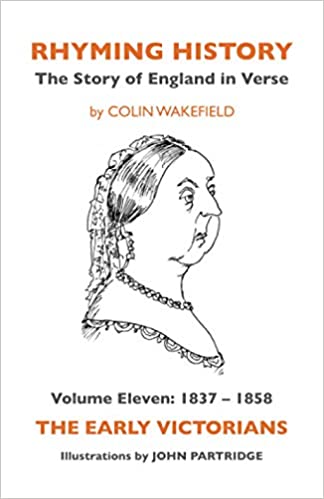Volume Eleven – 1837 – 1858
The Early Victorians
QUEEN VICTORIA: CHILDHOOD AND EDUCATION
THE POOR LAW
VICTORIA AND PRINCE ALBERT MARRY
VICTORIA AND PRINCE ALBERT VISIT CHATSWORTH
THE POTATO FAMINE
THE INCOMPARABLE CHARLES DICKENS
DEATH OF SIR ROBERT PEEL
DEATH OF WELLINGTON
MARY SEACOLE
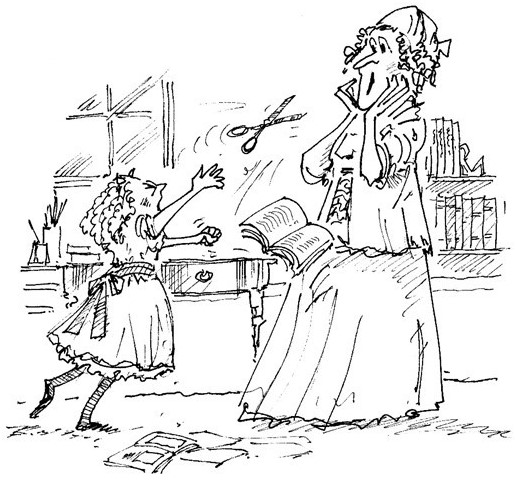
QUEEN VICTORIA: CHILDHOOD AND EDUCATION
Victoria’s first years were far from grand.
The family struggled, you understand.
Apart from the odd visit to Ramsgate,
Mother and daughter were left to their fate,
In a state of relative poverty,
At Kensington Palace. ‘Melancholy’
Was how the Queen would recall her childhood.
Poor and unloved, she was misunderstood,
A martyr to sadness and solitude.
Forgive me now, I don’t wish to be rude,
But this we should take with a pinch of salt.
Her temper tantrums were nobody’s fault
But her own. Once, out of sheer cussedness,
She threw her scissors at her governess,
Fräulein Lehzen. Yet she called her, no less,
“My precious Lehzen”, her very best friend,
Loyal, loving and true. Then to pretend,
As she was apt to do in later life,
That her mother failed her, cut like a knife.
The charge was undeniably unfair.
The Duchess was devoted to her care.
Indeed, the Princess never slept alone
Until the day she ascended the throne.
She shared a room with her mother, it’s said –
In fact, I believe that they shared a bed.
There was always someone to hold her hand
As she walked downstairs. Her routine was planned,
To the last detail. Far from being alone,
Victoria’s time was rarely her own.
Her schooling was above the average,
By all accounts, for a girl of her age.
She expressed herself “not fond of learning
“As a little child”. She was discerning
In her studies. She preferred to be read to,
Rather than to read. This Lehzen had to do.
A tutor was engaged when she was eight,
One of whose tasks was to eradicate
All trace of his pupil’s German accent.
Raised as she was by the Duchess of Kent,
This was no mean feat. One would never know
That the Princess was not ‘echt englisch’ though –
Apart from the odd, unexpected “Zo!”
The same fellow taught her geography,
Her letters, and some basic history.
Other tutors covered arithmetic
And languages. Though no academic,
These subjects she loved. Dancing she adored,
Painting and drawing. Science she abhorred.
As she grew up she developed a taste
For “the dear opera”. Far from straitlaced,
Italian composers she preferred,
Rossini and Bellini. Mark my word,
She relished their wit and lightness of touch,
Although Handel she didn’t care for much.
As educations go, a fair mix:
Languages, science, mathematics,
Geography… But what of politics?
Modern and European history?
The constitution? It’s a mystery
How these were overlooked. The future Queen
Knew nothing of the political scene,
At home or abroad. How could this have been?
Was she kept in the dark deliberately,
The victim, poor wretch, of a conspiracy?
This is a distinct possibility.
Back to top / Buy the book
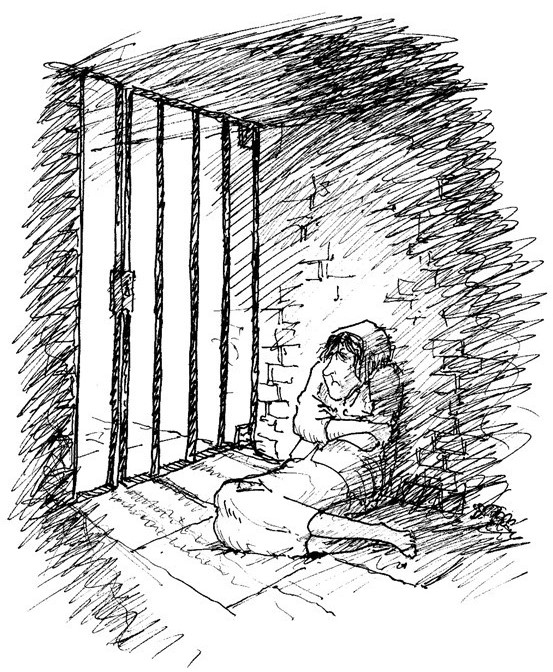
THE POOR LAW
Social reform bored Melbourne. “Very slack,”
Lord Russell thought him. Let me take you back
To the New Poor Law, so-called. Lord Melbourne
Viewed the reform with apathy (nay, scorn),
But nodded through the changes nonetheless.
He had little choice, I have to confess.
The tide was against him. As he voted
(In favour) in the Lords, it was noted
How he swore in an angry undertone.
Yet he wasn’t prepared to stand alone.
So he was party to the awful Law.
Poverty was all the fault of the poor –
That was the New Poor Law in a nutshell.
There was no clear incentive to do well
If poor relief was overgenerous.
The dreaded ‘workhouse test’ was onerous,
Demanding and severe. It spelt, in brief,
An end to the system of ‘out-relief’.
It was either the workhouse or nothing.
No charity at home, this was the sting.
To discourage the idle, the greedy
And the indolent, only the needy
And the desperate would be taken in.
Hard labour, confinement and discipline
Would deter all but the most destitute.
The rules were rigorous and absolute.
The Law provided for the segregation
Of married couples, such separation
To ensure the “proper regulation”
Of the workhouses. Make of that what you will.
Another particularly bitter pill
Was the drastic reduction in support
For single mothers. The legislators thought,
In their wisdom, that illegitimacy
Was encouraged by excess of charity.
They had a duty to promote chastity
By stigmatising the curse of bastardy.
As with the paupers, so with the ‘immoral’.
Enforcers of the Law had little quarrel
With the Benthamite argument, that ran thus:
Only the poorest of the poor need worry us;
The more unpleasant the relief, the less the fuss –
In economic terms a definite plus!
The horror stories soon came thick and fast.
The Law was hideous from first to last.
In one workhouse a certain Mrs. Wyse,
A poor inmate, got a nasty surprise.
Her wee daughter, two-and-a-half years old,
Was suffering from chilblains and the cold.
They were given leave to sleep together,
A rarity this. The bitter weather
(It was Christmas) was hard on the poor mite.
When Wyse sought leave to spend a second night
With her invalid child, this was refused.
When she spoke up, she was roundly abused,
Dragged downstairs and locked in the workhouse cage,
Without food or water, I kid you not.
She was given no coat, no chamber pot,
No bedding or straw, alone overnight,
At minus twenty degrees Fahrenheit.
She nearly froze to death. Need I say more?
I could cite other cases by the score.
Charles Dickens caught the mood. His first success,
The Pickwick Papers, is all fun, brightness
And jollity, a beguiling cocktail
Of froth and nostalgia. How could it fail?
In Oliver Twist he puts the boot in.
Dickens condemns the cruel discipline
Of the workhouse. “Please sir, I want some more!” –
Not the stuff of an entertaining score
For some musical or other nonsense,
But a moving story of conscience,
Exposing the nightmare of the Poor Law
In all its horror, as never before.
Lord Melbourne, far from recommending the book,
Advised against giving it a second look.
“It’s all about workhouses,” he told the Queen,
“And coffin makers,” things better left unseen.
I find these sentiments faintly obscene.
“I don’t like such things. I don’t like to see
“Them represented.” Now it seems to me
That the Queen was given rotten advice.
Britain was awash with poverty, vice,
Cruelty, crime and destitution.
Wilful blindness was no solution.
If you take the trouble to dig around
In his Lordship’s political background,
You will find much to shock you. For starters,
There’s the case of the Tolpuddle Martyrs.
Melbourne’s tenure as Home Secretary
Was drawing to a close, but it is he
Who must shoulder responsibility
For the famous events of ’34.
The emerging Trades Unions, he swore,
Were in conflict with economic law.
They were “inconsistent… and contrary
“To the law of nature”. Melbourne, you see,
Was a firm believer in laissez-faire.
Fear of disorder drove him to despair.
So when food riots and widespread unrest
Gripped the nation, he rose to the test.
In the run-up to the Great Reform Bill,
Melbourne demonstrated an iron will
In pressing the hesitant magistrates
To enforce the law. As one contemplates
The punishments suffered by young and old,
Poor ignorant rustics, the blood runs cold:
Draconian measures for minor crimes,
Hangings, transportation – violent times.
Rough justice they called it, par for the course.
Farmers and landowners wore themselves hoarse
In praise of our hero’s behaviour –
Cool under fire, Melbourne their saviour.
Back to top / Buy the book
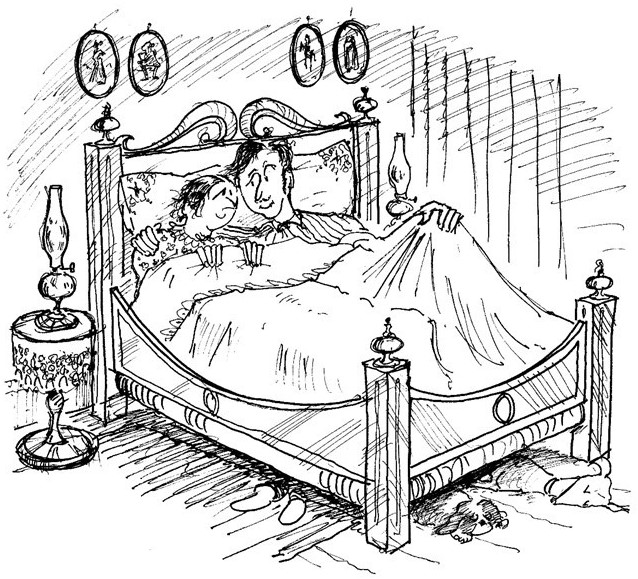
VICTORIA AND PRINCE ALBERT MARRY
It was a cold, bleak February day
For the royal wedding. Crowds lined the way,
Supportive and jubilant, come what may.
The Duke of Sussex gave his niece away
In St. James’s Palace, the Chapel Royal.
To the Whigs, as ever, the Queen was loyal:
The congregation of three hundred
Included just six Tories. She blundered,
But the guest list came as no great surprise.
She would have “only those who sympathise” –
Wholly predictable, but hardly wise.
For this was “my marriage”. Heavens above!
What of the bridegroom? When push came to shove,
Was he a cipher? The Queen was in love,
No doubt at all about that. As a wife,
This was “the happiest day of my life”.
She describes her wedding night. They undressed.
Her adored Albert, her “dearest, dearest”,
Of such “beauty, sweetness and gentleness”,
Spoke in terms of the deepest tenderness,
The like of which she had never heard before.
Then “we both went to bed” (this bit I adore) –
“Of course in one bed, to lie by his side
“On his dear bosom”. True love? You decide.
The Queen was head over heels, that’s for sure.
Her love was genuine, constant and pure.
Prince Albert himself is harder to read.
The catty Duchess of Bedford, indeed,
Doubted his passion. His German reserve
She mistook for indifference. What a nerve.
The following morning the Queen found time
To write to her uncle. This is sublime:
She was “the happiest, happiest being
“That ever existed”. She wrote with feeling:
“To look into those dear eyes is enough
“To make me adore him.” Wonderful stuff.
Back to top / Buy the book
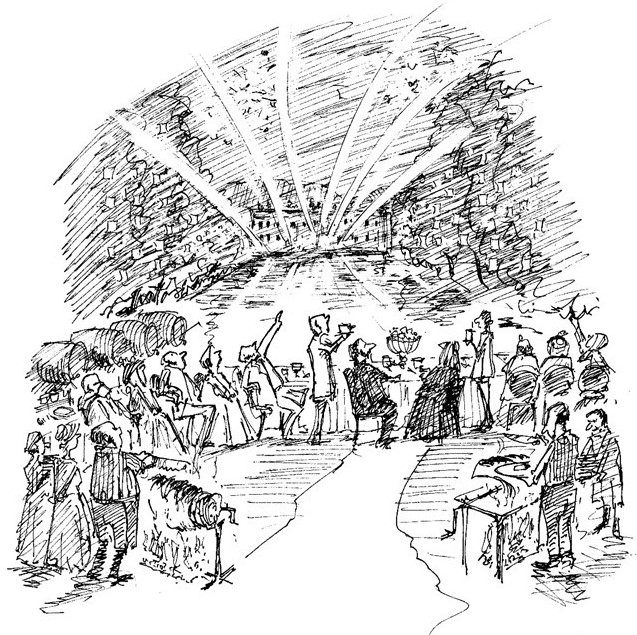
VICTORIA AND PRINCE ALBERT VISIT CHATSWORTH
To make their historic journey complete,
The couple drove to Chatsworth, country seat
Of the 6th Duke of Devonshire. Albert
Told Anson, who told Peel (this must have hurt),
That he counted Chatsworth the finest place
He had yet seen in England. To Peel’s face
The Prince would doubtless have been more discreet.
There were half a dozen oxen to eat,
Some two hundred gallons of ale to drink,
And as for the gardens (what do you think?)
Thousands of lanterns to light up the trees,
With fireworks to crown the festivities.
Joseph Paxton arranged this great display.
The most gifted gardener of his day,
This fellow let nothing stand in his way.
The Duke spotted the genius in him
And appointed young Joseph, on a whim,
His head gardener, aged just twenty-three.
He repaid the Duke’s trust, believe you me.
He built a giant conservatory,
In glass, and a stupendous rockery.
He designed a fountain, to great applause,
From water piped from the neighbouring moors.
Mark this: “I should have liked that man of yours
“For one of my generals.” Who said it?
The Duke of Wellington, to his credit.
Paxton’s hour had come. The time was ripe.
The ‘Great Stove’, so-called, was the prototype
For the Crystal Palace which made his name.
Three cheers for ‘Sir’ Joseph, as Paxton became.
Back to top / Buy the book
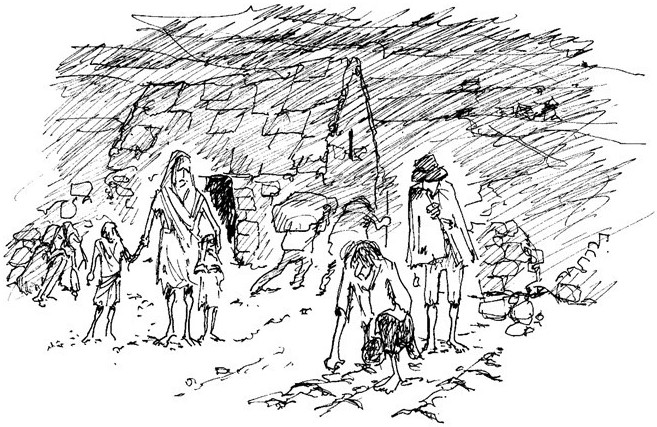
THE POTATO FAMINE
Poor harvests were one thing, potato blight
Another altogether. Ireland’s plight
Was critical. Would the rain never stop?
One third of the country’s potato crop
Turned bad. The fungus that rotted the spud
Had a thirst for damp and it loved the mud.
The following year, at enormous cost,
Three-quarters of the Irish crop was lost.
Potatoes were the staple peasant food.
Some three million (that’s a multitude)
Ate nothing else, and I do mean nothing.
Most adult males (now this is sobering)
Ate between twelve and fourteen pounds a day.
Imagine then the scale of the dismay
When the potato crop failed. Poor Ireland.
Thousands perished as famine stalked the land.
Peel was well aware of the need to act.
In secret, and with some degree of tact,
He drew up plans for the import of maize
From America. These were early days.
Was one hundred thousand pounds’ worth enough?
Well hardly, but this was alien stuff.
Peasants never got used to baking bread.
They preferred the potato. Enough said.
However, as the deadly fungus spread,
Maize became more popular bit by bit.
Government advice on how to cook it
Increased the demand. What of the market?
Forget laissez-faire, at least for a while.
The peasants were starving. It took some guile
On Peel’s part, with his belief in free trade,
To ‘fix’ the market. But the case was made.
He pressed on regardless and unafraid.
Thank God for Sir Robert’s humanity.
His successor, I can tell you for free,
Lord John Russell, tried another angle,
Landing himself in a rare old tangle.
Be that as it may. We must take a pause
And turn again to the dreaded Corn Laws.
Back to top / Buy the book
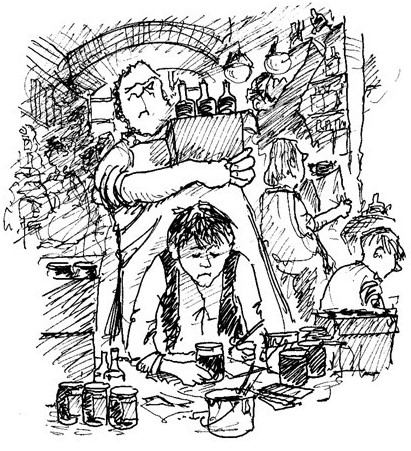
THE INCOMPARABLE CHARLES DICKENS
It’s a privilege to celebrate in rhyme
The finest storyteller of all time,
The great Charles Dickens. That’s my view, at least.
His novels are a veritable feast
Of character and eccentricity,
Dark satire and social comedy.
They plumb the depths of vice and villainy,
Violence, murder and depravity,
Then soar to the heights of humanity –
Pity, compassion and charity.
Touched at times with sentimentality,
A blemish I can readily forgive,
The novels have endured, proof positive
That Dickens’ plots and his characters live.
His secret? He wrote about what he knew.
Young Charles rescued himself, one of the few,
From poverty. When he was ten years old,
His education was put on hold
When his poor father plunged deep into debt,
Committed later, his lowest ebb yet,
To the Marshalsea, a debtors’ gaol.
Charles was then twelve. Was he destined to fail?
This he dreaded. He laboured for a year,
In work that afforded him little cheer,
In a blacking factory, near Charing Cross,
Pasting labels on bottles. I’m at a loss.
Six bob a week he earned, day in, day out,
Grim and depressing, no shadow of doubt.
Experience of grinding poverty
He described as “the secret agony
“Of my soul” which “no word can express…
“Utterly neglected and hopeless”.
Only Catherine Hogarth, his wife,
Knew the story of his early life –
She and his closest friend, John Forster,
Theatre critic and biographer.
His father’s release from the Marshalsea
Won Charles his freedom from the factory.
At fifteen, after a return to school,
He swapped his pupil’s desk for a clerk’s stool
In a modest solicitor’s office,
An opportunity too good to miss.
Characters that hold his readers agog –
Jaggers and Tulkinghorn, Dodson and Fogg,
As well as Bleak House (its intricate plot,
Jarndyce v. Jarndyce) – were, as like as not,
Inspired by these early days in the law.
Life as a clerk proved a terrible bore.
In the evenings he studied shorthand
And (still in his teens, you should understand)
He took work as a reporter, freelance,
In Doctors’ Commons. Here, by happy chance,
He mastered his craft observing the clerks,
Bailiffs, scriveners and turnkeys. What larks!
Dip into Bleak House, Martin Chuzzlewit,
David Copperfield or Little Dorrit,
You’ll be sure to find a lawyer in it,
Or a law officer, proud or humble,
Counsel or beadle, Buzfuz or Bumble.
The Pickwick Papers was a famous hit.
Dickens’ first, it enjoyed the benefit
Of publication in serial parts,
Monthly instalments. It soon touched the hearts
Of thousands. After the slowest of starts
(A mere four hundred copies) it took off
Like a rocket. At one shilling (don’t scoff)
The issue price was a spit and a cough
Against the cost of an average book,
At thirty-two shillings. Do take a look.
The adventures of Samuel Pickwick,
Comic, romantic and mock-heroic,
Proved a phenomenal, instant success.
Up to 40,000 readers, no less,
Were soon enjoying the foibles, mishaps
And scrapes of that charming trio of chaps,
Snodgrass, Tupman and Winkle. Sam Weller,
Cockney servant, an excellent fella,
Made his first appearance in issue four.
Dickens was pushing at an open door.
Sales hit the roof. Cynics who had surmised
That monthly instalments were ill advised
Were silenced, and not a little surprised.
Dickens set a trend. Trollope, Thackeray
And George Eliot would choose the same way,
Published, all, in the journals of the day.
The book is set in the pre-railway age.
Nostalgia colours every page,
A disappearing world: Dingley Dell,
Pre-Reform England, vanishing pell-mell.
In spite of its old-fashioned atmosphere,
One thing nonetheless is strikingly clear:
Dickens’ unerring sense of comedy –
What one called his “endless fertility
“In laughter-causing detail”. Well, that said,
Samuel Pickwick and his friends, well fed,
Affluent, witty and game for a laugh,
Merit little more than a paragraph
In a sweep through the Dickens catalogue.
Some of the books can be rather a slog,
Bleak House being one, Dombey and Son too.
But what marked Charles Dickens out, what was new,
Was his unique view of society
In all its infinite variety –
Complex, comic and corrupt. Property
And privilege, greed and pomposity;
Sorrow, disease and grinding poverty –
These were Dickens’ canvas. It seems obscene
That Melbourne sought to influence the Queen
To abandon Oliver Twist. The poor,
His lordship urged, it was best to ignore!
Her verdict I find rather depressing.
Far from finding the story distressing,
The book, she wrote, was “very interesting”.
Back to top / Buy the book
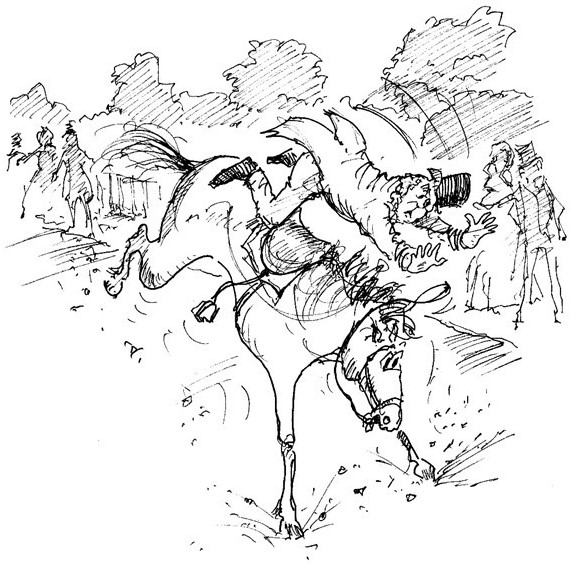
THE DEATH SIR ROBERT PEEL
The following morning dawned clear and bright,
A busy day ahead, to Peel’s delight.
First, a meeting of the Commission
On the forthcoming Exhibition;
Then to his study in the afternoon;
And finally, not a moment too soon
(For this he loved), his customary ride
At five o’clock. Peel was well satisfied
That his mount, a recent acquisition,
Was a fine horse, in tip-top condition.
His son-in-law had recommended the beast,
Good-tempered and steady, a comfort at least.
It later transpired that the wretched horse –
Dozens came forward to say so, of course –
Had a reputation for kicking.
What happened next was simply sickening.
At the top of Constitution Hill,
A stone’s throw from St. George’s Hospital,
The horse bucked, throwing Peel over its head,
Hard to the ground. His life hung by a thread.
The horse then fell on him, striking his back.
He blacked out. Sir Robert was on the rack.
They carried him home in hideous pain.
He recovered consciousness again,
But the fracture of his left collar bone,
And a number of his ribs – these alone
Were agony. It was ripped cartilage
And a massive internal haemorrhage
That hastened the crisis. The Prince, no less,
Paid his respects, in a state of distress.
The Duke of Wellington made two visits.
The sickroom, to most, was beyond limits,
But outside Whitehall Gardens the crowds grew.
Peel was the people’s friend, and this they knew.
They gathered in silence, plain working folk.
Corn Law reform, Sir Robert’s masterstroke,
Had changed their lives. Bread they could now afford.
It is little wonder Peel was adored.
Three days after the accident he died.
In the Lords, Wellington broke down and cried.
He spoke of Sir Robert’s passion for truth.
Never, even in the days of his youth,
Had he been known to utter one word
That he did not fully believe. Absurd,
For a man in public life? Wellington
Should surely be trusted, if anyone.
“A great light” (this the Earl of Aberdeen)
“Has disappeared from amongst us.” The Queen
Was moved to write to her uncle to say,
“Poor dear Peel is to be buried today”.
She had trouble keeping her tears at bay.
“The sorrow and grief at his death,” she wrote,
“Are most touching. The country mourns” (I quote)
“Over him as over a father.” Yes,
A feeling of overwhelming sadness
Swept the nation. It was raining hard
As they laid him to rest. In the churchyard,
And the wide expanse of park and woodland
Around Drayton, mourners stood, hand in hand,
Country labourers, workmen with their wives
And little children. The record survives.
Shops closed their shutters, flags flew at half mast,
The mills locked their gates as folk stood aghast,
Shocked to the core, barely able to speak.
The French Assembly (this was unique),
In due deference to the ‘Peel effect’,
Suspended their sitting out of respect.
Sir Robert Peel, aged sixty-two, was dead.
The mighty Times hit the nail on the head:
“The greatest statesman of his time,” it said.
Back to top / Buy the book
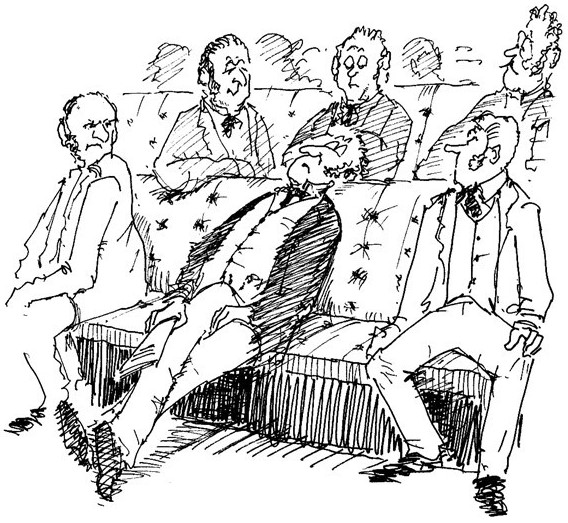
THE DEATH OF WELLINGTON
Celebrated by Alfred Tennyson,
The poet, as “the last great Englishman”,
The famous ‘Iron Duke’ of Wellington
Slipped peacefully away in September.
As well as the great victor, remember,
Of Waterloo, the Duke was a statesman
Of considerable weight. Wellington
Lent his support to emancipation
For Catholics – something of a volte-face,
Given his personal views on the Mass.
Never afraid of a gathering storm,
He gave his backing to Corn Law reform.
He stood by Sir Robert. He disagreed
With Peel, but in Britain’s hour of need
He backed repeal. He owed it to the Queen.
Though prone to snoozing in the Lords (as we’ve seen),
It was his bounden duty to intervene.
Loyalty was the Iron Duke’s middle name,
Military genius his claim to fame.
Waterloo was “a damned close-run thing,” he swore.
The battle was fought to the death, to be sure,
But Wellington’s Army showed Boney the door.
The noble Duke was eighty-three when he died.
Victoria was bereft. Oh, how she cried.
The Duke’s body lay in state in the Great Hall,
All decked out in black, of Chelsea Hospital.
Thousands came to pay their respects. In the rush
To file past, a number were killed in the crush.
Over a million mourners lined the route
To St. Paul’s, a fitting and moving tribute
To a most extraordinary statesman.
In the crypt, next to Admiral Lord Nelson,
He was laid to rest. “Our immortal hero,”
The grieving Queen called him. Whether friend or foe,
Few could quarrel with what The Times had to say:
The Duke’s life was “one unclouded longest day”.
Back to top / Buy the book
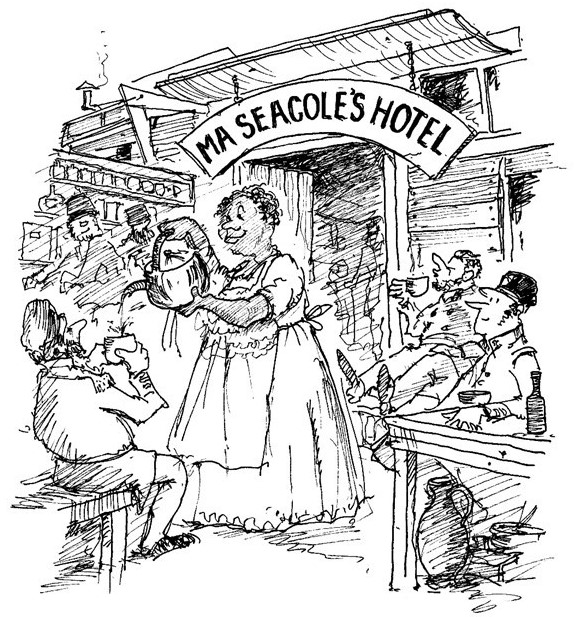
MARY SEACOLE
Another pioneering heroine,
One steeped in alternative medicine,
Was Mary Seacole. Of mixed parentage –
Her mother of Jamaican heritage
And her father a Scot – ‘Mother Seacole’,
As she was known, was a tough old soul.
Strong as an ox, and with sound common sense,
She had thirty years of experience
As a nurse living in the West Indies.
Cholera brought Jamaica to its knees –
32,000 cases, if you please.
The victims of this terrible disease
Mary treated with her ‘home’ remedies:
“Mustard plasters” on the stomach and back,
“Calomel” (for the worst kind of attack),
And “warm fomentations”. Folk were blessed:
A ministering angel. What was best
She selected “from my medicine chest”.
She never went anywhere without it,
And who are we to have cause to doubt it?
Mother Seacole: part doctor and part nurse –
The folk of Jamaica could have done worse.
Mary befriended the officers and men
Stationed in Jamaica. Imagine, then,
How she felt when she read of the campaign
In the Crimea, of the dreadful strain
That the troops were suffering. Some she knew.
Ma Seacole was clear what she had to do.
She travelled to London to volunteer
As one of Nightingale’s nurses. Oh, dear:
Mary was rebuffed at every turn.
It sadly didn’t take her long to learn
That her colour was the reason for this,
A blatant case of racial prejudice.
From the Crimea Fund she also sought
A grant to travel. This too came to nought.
With the tears rolling down her cheeks, Mary stood
“In the fast-running streets”. Yet all would come good,
On this she was resolved. She’d go if she could.
She was bound for the Crimea, come what may.
Ever the optimist, the very next day
She had cards printed: “THE BRITISH HOTEL” –
She knew what she wanted, which augured well –
“MRS. MARY SEACOLE, late of Kingston,
“Jamaica.” Mary was sure to get on.
To start a hotel was her fixed intent.
The Crimea beckoned – so off she went!
Upon her arrival in Scutari
She sought a bed for the night. Who are we
To pass judgement on Florence Nightingale?
Mary certainly did not. But to fail
To be offered employment was nonsense,
Given her record and experience.
“What do you want?” the Englishwoman said.
“Anything we can do for you?” A bed,
No more, she was given in the washroom –
Unfit for anyone else, I presume.
She writes, “I saw much of Miss Nightingale
“At Balaklava” – but to no avail,
I suspect, since she gives little detail.
So long as Mary Seacole knew her place,
Florence was happy. A proper disgrace.
At Balaklava, Mary’s claim to fame
Was the British Hotel. To great acclaim,
She built it out of nothing: old driftwood,
Iron sheets (she used anything she could),
Even packing cases and broken doors.
The edifice opened, to wild applause,
At a final cost of eight hundred pounds.
That is quite as expensive as it sounds –
But Mary was soon turning a profit.
Just as well, since she had to live off it.
She’d run a boarding house in Kingston, too,
Along with her mother. So, nothing new.
She combined her talents. “A mess-table”
Mary provided, when she was able,
And “comfortable quarters” (the words are hers)
For “sick and convalescent officers”.
She also visited the battlefield
Under heavy fire, refusing to yield.
She suffered some near misses. We shall see,
When Sebastopol fell, that it was she,
Ma Seacole, who was the first woman in.
Comfort in abundance she brought, chicken,
Bandages, lemonade, cake, medicine,
Lashings of love and (quite possibly) gin.
“A warm and successful physician,”
Is how William Russell described her.
An eccentric she was, who caused a stir,
Who “doctors and cures all manner of men” –
These the chosen words of Russell again –
“With the most extraordinary success”.
It was her strength of character, no less,
That was Mother Seacole’s secret. She wrote
Her memoirs (from which I’ve ventured to quote):
Wonderful Adventures of Mary Seacole
In Many Lands. Sometimes tragic, often droll,
Hers is a story you cannot pigeon-hole.
Whether serving up a chicken casserole,
Or offering succour to a dying man,
Mary was a one-off. Russell was a fan.
Who cares whether Nightingale was one or not?
Mother Seacole’s case was as good as it got.

